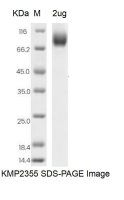服务电话:400-621-6806
地址:天津市武清区国际企业社区A5号楼五层,301700
邮箱:info@kmdbioscience.com
| 产品编号 | KMP2355 |
|---|---|
| 产品名称 | Human CD274 Protein, Flag Tag |
| 产品描述 | The Human CD274 Protein(KMP2355) is produced in HEK293 Cells and the target gene encoding Phe19-Thr239 is expressed with a Flag tag at the C-terminus. |
| 物种 | Human |
| 宿主 | HEK293 Cells |
| 规格 | 50ug, 100ug, 200ug |
| 纯化方式 | Affinity purification |
| 内毒素水平 | <1.0 EU/ug determined by the LAL method |
| 缓冲体系 | 20mM PB, 150mM NaCl, pH7.4 |
| SDS-PAGE |  |
| 功能 | Inhibitory receptor on antigen activated T-cells that plays a critical role in induction and maintenance of immune tolerance to self. Delivers inhibitory signals upon binding to ligands CD274/PDCD1L1 and CD273/PDCD1LG2 . Following T-cell receptor (TCR) engagement, PDCD1 associates with CD3-TCR in the immunological synapse and directly inhibits T-cell activation. Suppresses T-cell activation through the recruitment of PTPN11/SHP-2: following ligand-binding, PDCD1 is phosphorylated within the ITSM motif, leading to the recruitment of the protein tyrosine phosphatase PTPN11/SHP-2 that mediates dephosphorylation of key TCR proximal signaling molecules, such as ZAP70, PRKCQ/PKCtheta and CD247/CD3zeta. The PDCD1-mediated inhibitory pathway is exploited by tumors to attenuate anti-tumor immunity and escape destruction by the immune system, thereby facilitating tumor survival . The interaction with CD274/PDCD1L1 inhibits cytotoxic T lymphocytes (CTLs) effector function . The blockage of the PDCD1-mediated pathway results in the reversal of the exhausted T-cell phenotype and the normalization of the anti-tumor response, providing a rationale for cancer immunotherapy . |
| 产品背景 | CD274, also known as B7-H1 or programmed death ligand 1(PD-L1), is a 40 kD type I transmembrane protein and a member of the B7 family within the immunoglobulin receptor superfamily. Programmed death-1 ligand-1(PD-L1, CD274, B7-H1) has been identified as the ligand for the immunoinhibitory receptor programmed death-1(PD1/PDCD1) and has been demonstrated to play a role in the regulation of immune responses and peripheral tolerance. By binding to PD1 on activated T-cells and B-cells, PD-L1 may inhibit ongoing T-cell responses by inducing apoptosis and arresting cell-cycle progression. Accordingly, it leads to growth of immunogenic tumor growth by increasing apoptosis of antigen specific T cells and may contribute to immune evasion by cancers. PD-L1 thus is regarded as promising therapeutic target for human autoimmune disease and malignant cancers. |
| 保存条件 | Aliquot and store at -20℃ to -80℃. Avoid repeated freezing and thawing cycles. |
| 说明 | This product is for research use only. |
| 参考文献 | 1.Ann. N. Y. Acad. Sci. 1217:45-59 (2011) 2.Gene 638:20-25 (2018) |